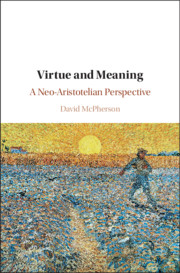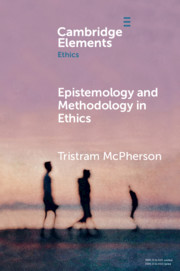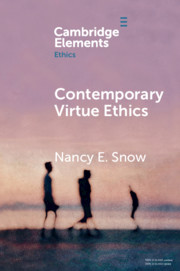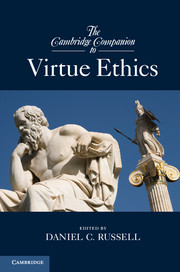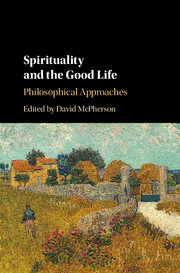Virtue and Meaning
A Neo-Aristotelian Perspective
£30.99
- Author: David McPherson, Creighton University, Omaha
- Date Published: July 2021
- availability: Available
- format: Paperback
- isbn: 9781108745192
£
30.99
Paperback
Other available formats:
Hardback, eBook
Looking for an inspection copy?
This title is not currently available on inspection
-
The revival of Aristotelian virtue ethics can be seen as a response to the modern problem of disenchantment, that is, the perceived loss of meaning in modernity. However, in Virtue and Meaning, David McPherson contends that the dominant approach still embraces an overly disenchanted view. In a wide-ranging discussion, McPherson argues for a more fully re-enchanted perspective that gives better recognition to the meanings by which we live and after which we seek, and to the fact that human beings are the meaning-seeking animal. In doing so, he defends distinctive accounts of the relationship between virtue and happiness, other-regarding demands, and the significance of linking neo-Aristotelian virtue ethics with a view of the meaning of life and a spiritual life where contemplation has a central role. This book will be valuable for philosophers and other readers who are interested in virtue ethics and the perennial question of the meaning of life.
Read more- Frames the re-emergence of Aristotelian virtue ethics in the last half-century as a response to the modern problem of disenchantment
- Considers the links between contemporary virtue ethics and recent literature on meaning in life
- Challenges received wisdom about other-regarding ethical demands, spirituality and contemplation in neo-Aristotelian virtue ethics
Reviews & endorsements
'This book is strikingly excellent. It is beautifully argued, fair-minded, and a pleasure to read. It is also the most authentically neo-Aristotelian account of ethics and the moral life that I have read. In making a case for a higher, more noble, more meaningful form of life, it deserves to be widely considered, and I would not be surprised if people someday spoke of it alongside works by G.E.M. Anscombe, Alasdair MacIntyre, Charles Taylor, and a few others.' Stephen R. Grimm, Fordham University, New York
See more reviews'Like other animals, human beings live lives that can be flourishing or not so flourishing. But they also quest for meaning in their lives and in their world. McPherson's fine new book is both an exploration of the joins and the gaps between these two aspects of human nature, and also itself an example of that quest.' Sophie-Grace Chappell, The Open University
'An original and finely crafted study that takes us way beyond the standard agenda of modern virtue ethics. McPherson persuasively and illuminatingly argues that the human search for fulfilment needs to be understood within a much richer and more resonant framework of objective meaning and value than is allowed for by most contemporary moral philosophers.' John Cottingham, University of Reading, University of Roehampton, London, and Honorary Fellow of St John's College, University of Oxford
'This book could be read by undergraduates and seasoned academics alike. McPherson does a good job of summarizing the relevant aspects of contemporary virtue theory such that students unfamiliar with this literature should still be able to follow the argument, but not at the expense of nuance.' Sarah Pawlett Jackson, Religious Studies Review
Customer reviews
Not yet reviewed
Be the first to review
Review was not posted due to profanity
×Product details
- Date Published: July 2021
- format: Paperback
- isbn: 9781108745192
- length: 231 pages
- dimensions: 228 x 152 x 13 mm
- weight: 0.349kg
- availability: Available
Table of Contents
Introduction: toward re-enchantment
1. The human form of life
1.1 Neo-Aristotelian ethical naturalism: the disenchanted version
1.2 The human difference: rationality
1.3 The standpoint from within our human form of life: the space of meaning
1.4 Strong evaluative meaning
1.5 Going further: the way forward
2. Virtue, happiness, and meaning
2.1 The instrumentalist account
2.2 The constitutive account: strong evaluative version
2.3 The constitutive account: weak evaluative version
2.4 Virtue apart from happiness?
2.5 Virtue, loss, and the meaning of life
3. Other-regarding concern
3.1 MacIntyre on other-regarding concern
3.2 Intrinsic worth: dignity and sanctity
3.3 Fully amongst us: solidarity with the severely afflicted and other marginalized humans
3.4 Moral absolutes
3.5 Spheres of other-regarding concern: universal and particular
4. Cosmic outlooks
4.1 Hursthouse's three theses and Williams' challenge
4.2 Identifying what is noblest and best
4.3 Against quietism: the need for a moral ontology
4.4 Rival cosmic outlooks
4.5 A poker-faced universe?
5. Homo Religiosus
5.1 What is spirituality?
5.2 What kind of naturalism?
5.3 Human beings as Homo Religiosus
5.4 The contemplative life
5.5 Theistic spirituality
5.6 Objections and replies
Conclusion.
Sorry, this resource is locked
Please register or sign in to request access. If you are having problems accessing these resources please email [email protected]
Register Sign in» Proceed
You are now leaving the Cambridge University Press website. Your eBook purchase and download will be completed by our partner www.ebooks.com. Please see the permission section of the www.ebooks.com catalogue page for details of the print & copy limits on our eBooks.
Continue ×Are you sure you want to delete your account?
This cannot be undone.
Thank you for your feedback which will help us improve our service.
If you requested a response, we will make sure to get back to you shortly.
×
